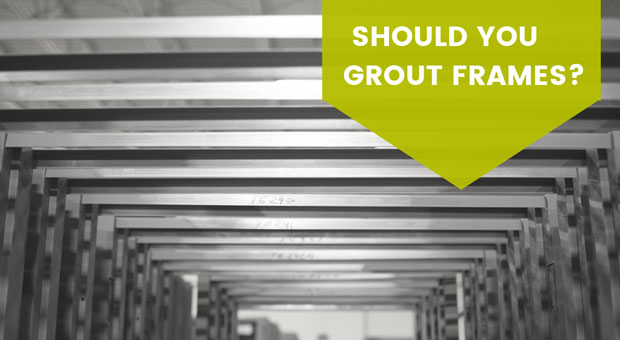Grouting a frame is when the internal cavity of the frame is filled with masonry or mortar – also referred to as grout – during frame installation. The grout is created by combining a grout mixture, similar to cement, and water together. Grouting is thought to help stabilize a frame, increase durability, and deaden sound.
Should You Grout a Frame?
There are numerous conflicting opinions within the industry if this service is necessary or not. There is the misconception that grouting is 100% necessary, but it isn’t. In 2004 the Steel Door Institute released an industry alert called SDI 127I-04, stating that grout should never be specified for drywall construction. Nine years later, Steel Door Institute released an industry statement in their July 2013 newsletter stating that grouting is not necessary for masonry construction and in general, there are more risks than rewards when it comes to grouting frames. Below are a few common scenarios regarding grouting, fire-rated frames, and information about deadening sound.
Drywall Construction
When it comes to drywall construction, grouting frames is not encouraged. Grout is a liquid substance and as it begins to dry the moisture will not be able to escape the frame. The moisture could then seep into the drywall and weaken it, which affects the frame’s strength and integrity. The moisture could also go to the bottom of the frame or into the hardware, resulting in rust.
Masonry Construction
Grouting is not necessary when it comes to masonry construction. A frame which is properly anchored to the wall will not be made sturdier with grouting. Some people choose to grout a frame to help deaden sound transmission, however, filling the frame with insulation will achieve the same effect. If you choose to grout the frames for masonry construction, following the correct process is essential. The grout should be the correct consistency (a maximum 4” slump) to avoid excess moisture; you should also use a hand trowel, not a pump. Prior to grouting, the application of a corrosion-resistant coating to the backside of the frame can also help protect the frame by providing a barrier between it and moisture from the grout. This is something that is preferred to be completed in the field.
Fire Rated Frames
When it comes to fire-rated frames, grout is not required in masonry or drywall construction at any hourly rate. This is stated in industry standards documentation such as ANSI/SDI A250.8, HMMA-820 and SDI 118, in addition, this information is available in other fire-rated frame documents.
Sound Impact
If you are concerned about sound traveling, foam insulation is a great alternative to grout, because it will help deaden sound to the same extent as grout. A benefit of foam insulation is that there is no risk of moisture that could cause damage and/or rust to your new frame, hardware or the drywall surrounding.
At LaForce, we do not recommend grouting a frame due to the risks associated with it. If you have additional questions about grouting frames feel free to fill out LaForce’s easy-to-use contact form and a member of our team will be in touch with you shortly.



Follow Us